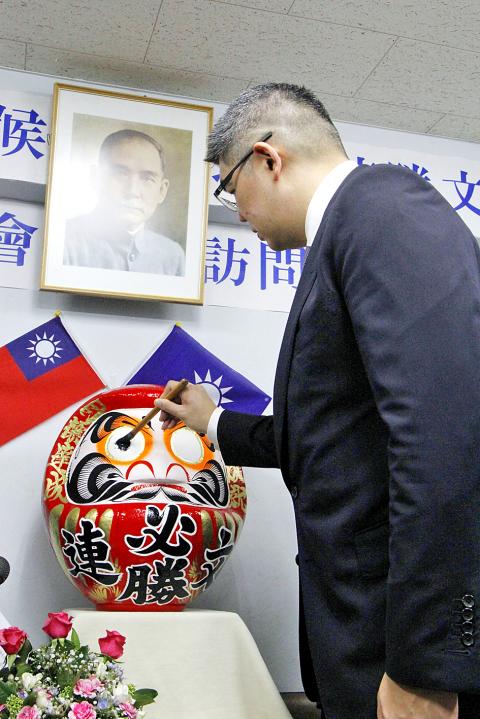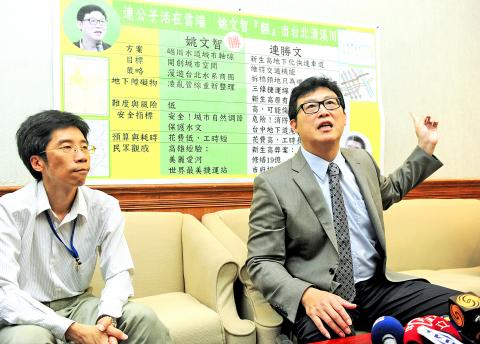Chinese Nationalist Party (KMT) Taipei mayoral candidate Sean Lien’s (連勝文) proposal to put the city’s elevated Xinsheng Expressway underground has met with ridicule.
Democratic Progressive Party Legislator and Taipei mayoral hopeful Pasuya Yao (姚文智) yesterday said that Lien’s idea shows he “has height, but no depth in his brain.”
Lien reportedly proposed the idea on Wednesday after meeting former Japanese prime minister Junichiro Koizumi during Lien’s four-day tour of Japan, according to the Chinese-language United Daily News.

Photo: CNA
The United Daily News reported that Koizumi brought up the topic with Lien because while in power, Koizumi had put forward a plan to tear down some elevated expressways over the Nihonbashi in Tokyo that were built for speedy completion and to bypass land expropriation before the 1964 Tokyo Olympics.
It has been reported that Tokyo Governor Yoichi Masuzoe also supported burying the 50-year-old elevated expressways because he believed it would be a way to stem endless budget spending for their maintenance.
However, experts have warned that underground expressways are hard to renovate after earthquakes, and that there are flooding and tunnel safety issues.

Photo: Lo Pei-der, Taipei Times
Lien was quoted as saying: “I think the idea can be borrowed for [Taipei’s] 30-year-old Xinsheng Expressway.”
He reportedly said that urban renewal tops Taipei residents’ list of priorities and those living in the city’s Zhongshan District (中山) — where the expressway is located — want the “dangerous bridge” brought down.
Lien’s remarks sparked fierce debate online, with many people saying that under the Xinsheng Expressway lies a water channel built in 1933, which used to be called Horikawa (堀川).
“What could be wrong with turning Taipei into a city floating on water like Venice or building Taipei an undersea tunnel?” netizens joked.
Others questioned whether Lien lives in the same city as they do.
Yao yesterday accused Lien of barely understanding Taipei, saying that along with the water channel, there is the small issue of the existing underground transport lines of the Taiwan High Speed Rail Corp (台灣高鐵 ) line 6m below ground, the Taiwan Railways line 10m underground and two Mass Rapid Transit lines.
“Are you proposing to dig down 20m to bury the expressway?” said Yao, who said his proposal of closing down Taipei International Airport (Songshan airport), would render the Xinsheng Expressway unnecessary and make its demolition possible.
“Liu-Kong Canal [built in 1740] and its drains [of which Horikawa is one] could then resurface and canal culture could be developed,” the DPP candidate added.

TRAGEDY STRIKES TAIPEI: The suspect died after falling off a building after he threw smoke grenades into Taipei Main Station and went on a killing spree in Zhongshan A 27-year-old suspect allegedly threw smoke grenades in Taipei Main Station and then proceeded to Zhongshan MRT Station in a random killing spree that resulted in the death of the suspect and two other civilians, and seven injured, including one in critical condition, as of press time last night. The suspect, identified as a man surnamed Chang Wen (張文), allegedly began the attack at Taipei Main Station, the Taipei Fire Department said, adding that it received a report at 5:24pm that smoke grenades had been thrown in the station. One man in his 50s was rushed to hospital after a cardiac arrest

SAFETY FIRST: Double the number of police were deployed at the Taipei Marathon, while other cities released plans to bolster public event safety Authorities across Taiwan have stepped up security measures ahead of Christmas and New Year events, following a knife and smoke bomb attack in Taipei on Friday that left four people dead and 11 injured. In a bid to prevent potential copycat incidents, police deployments have been expanded for large gatherings, transport hubs, and other crowded public spaces, according to official statements from police and city authorities. Taipei Mayor Chiang Wan-an (蔣萬安) said the city has “comprehensively raised security readiness” in crowded areas, increased police deployments with armed officers, and intensified patrols during weekends and nighttime hours. For large-scale events, security checkpoints and explosives

A car bomb killed a senior Russian general in southern Moscow yesterday morning, the latest high-profile army figure to be blown up in a blast that came just hours after Russian and Ukrainian delegates held separate talks in Miami on a plan to end the war. Kyiv has not commented on the incident, but Russian investigators said they were probing whether the blast was “linked” to “Ukrainian special forces.” The attack was similar to other assassinations of generals and pro-war figures that have either been claimed, or are widely believed to have been orchestrated, by Ukraine. Russian Lieutenant General Fanil Sarvarov, 56, head

PUBLIC SAFETY: The premier said that security would be tightened in transport hubs, while President Lai commended the public for their bravery The government is to deploy more police, including rapid response units, in crowded public areas to ensure a swift response to any threats, President William Lai (賴清德) said yesterday after a knife attack killed three people and injured 11 in Taipei the previous day. Lai made the remarks following a briefing by the National Police Agency on the progress of the investigation, saying that the attack underscored the importance of cooperation in public security between the central and local governments. The attack unfolded in the early evening on Friday around Taipei Main Station’s M7 exit and later near the Taipei MRT’s Zhongshan